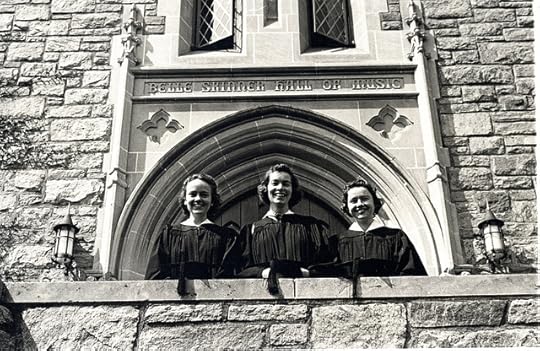On conversations among ladies or discovering Mary McCarthy's The Group

So finally - finally - after reading about it over the years I got a copy of Mary McCarthy's The Group. Set in the 1930s, it follows the lives of eight Vassar graduates known collectively as "the group" as they make their way post 1933 graduation* through marriage, motherhood and/or career independence. They come together in groups large and small in NYC, dropping in and out of each others lives, being snarky and supportive depending on the situation. It sounds like nothing special and yet if you have read it then you know how gripping this book truly becomes as chapter after chapter reveals more and more about the characters. From Kay's hopeful and then devastating wedding to Priss's multiple miscarriages and then conflicted feelings about parenthood to Helene's determined stance on singlehood, Dottie's bad love affair and Polly's challenge with her father's psychological issues, everything the modern woman struggles with is in this book. The fact that it is set nearly eighty years ago means little, in fact in the face of the current birth control wars, the chapters on sex are all the more significant.
There were a couple of passages that stood out for me for different reasons. Here's a bit from a chapter on Libby who is working as a slush pile reader and freelance book reviewer for magazines and newspapers based in NYC. She was paid by the manuscript or review and here's how she saw the business:
The book-review editors were like kings (or queens), she always fancied, holding levees, surrounded by their courtiers, while petitioners waited eagerly in the anteroom and footmen (that is, office boys) trotted back and forth. And, like kings, they had power of life and death in their hands. She had got to know the other reviewers or "clients" as the Roman would have called them, quite well by site - middle-aged bohemian women with glasses or too much rouge and dangly earrings and worn briefcases or satchels; pimply young men in suits that looked as if they were made of paper....Among the book reviewers, there was a great deal of jealousy and spite; the young men with acne and eroded teeth always looked her up and down contemptuously and then positively hissed when she got ushered in ahead of them. Yet a lot of these would-be-reviewers were dishonest; instead of reviewing the book their object was to walk off with an armful and sell them to some little second-hand man without even looking at them. Which was unfair to the honest reviewer and even more so to the author and the publisher; any book that got published deserved the courtesy of a review.
So even in 1963, when The Group was first published, reviewers selling ARCs on the side was a problem!
On a more serious note, the chapter where Kay finds herself held in a psych ward is quite harrowing (and frustrating!) and this bit about the evolving view of relationships really struck me as well:
It was plain to Polly that many of her married classmates were disappointed in their husbands and envied the girls, like Helena, who had not got married. In June the class would have its fifth reunion and already it had its first divorcees. These hares were discussed wistfully by the tortoises of the class. It was felt that they at least "had done something".
What's interesting is that McCarthy is not advocating for singlehood over marriage - Polly in particular ends up quite happily married - but it is clear that the girls who married quickly, the ones who married with little idea beyond fairy tales images, were vastly disappointed. Clearly the author was cautioning that marriage was not the prize to be grabbed quickly, but rather something to be carefully considered. Again - timeless, advice for sure.
The other point McCarthy is making dwells on the conflict between education and societal expectation. These are women who often find themselves pretending to be inferior to their husbands and other men and wistfully recalling intellectual conversations in college. Their mothers seem to wish they had not gone; that life would have been happier without that door opened. Clearly McCarthy wanted to challenge this idea but she does not give a happy ending for everyone and leaves more than one of the group pondering what the true nature of happiness is. I can just imagine what they will be like when the 1950s hit.
Needless to say, I loved The Group from start to finish and can't wait to send a copy to my mother who is going to love it as well. Now, of course, I am well on my way to Mary McCarthy obsession and shall be reading many of her other books as well.
*McCarthy herself was a 1933 grad, following in the footsteps of her aunt and grandmother. Clearly, the book is quite autobiographical!
[Post pic of Vassar friends at Skinner Hall, 1939.]




